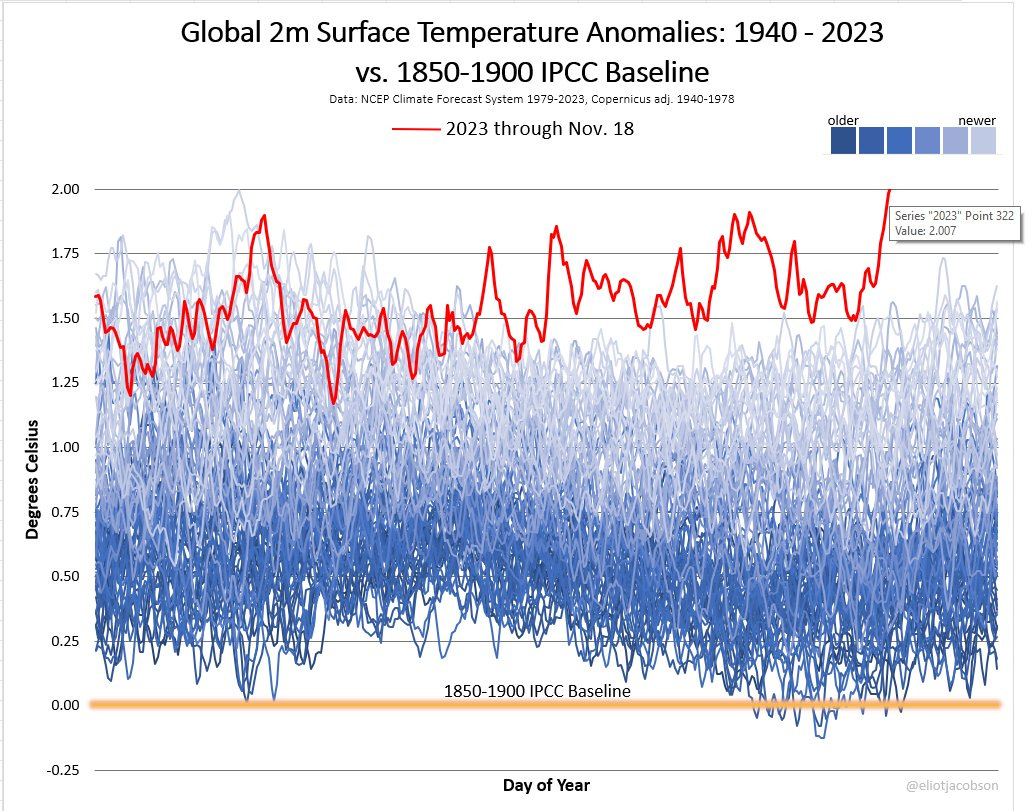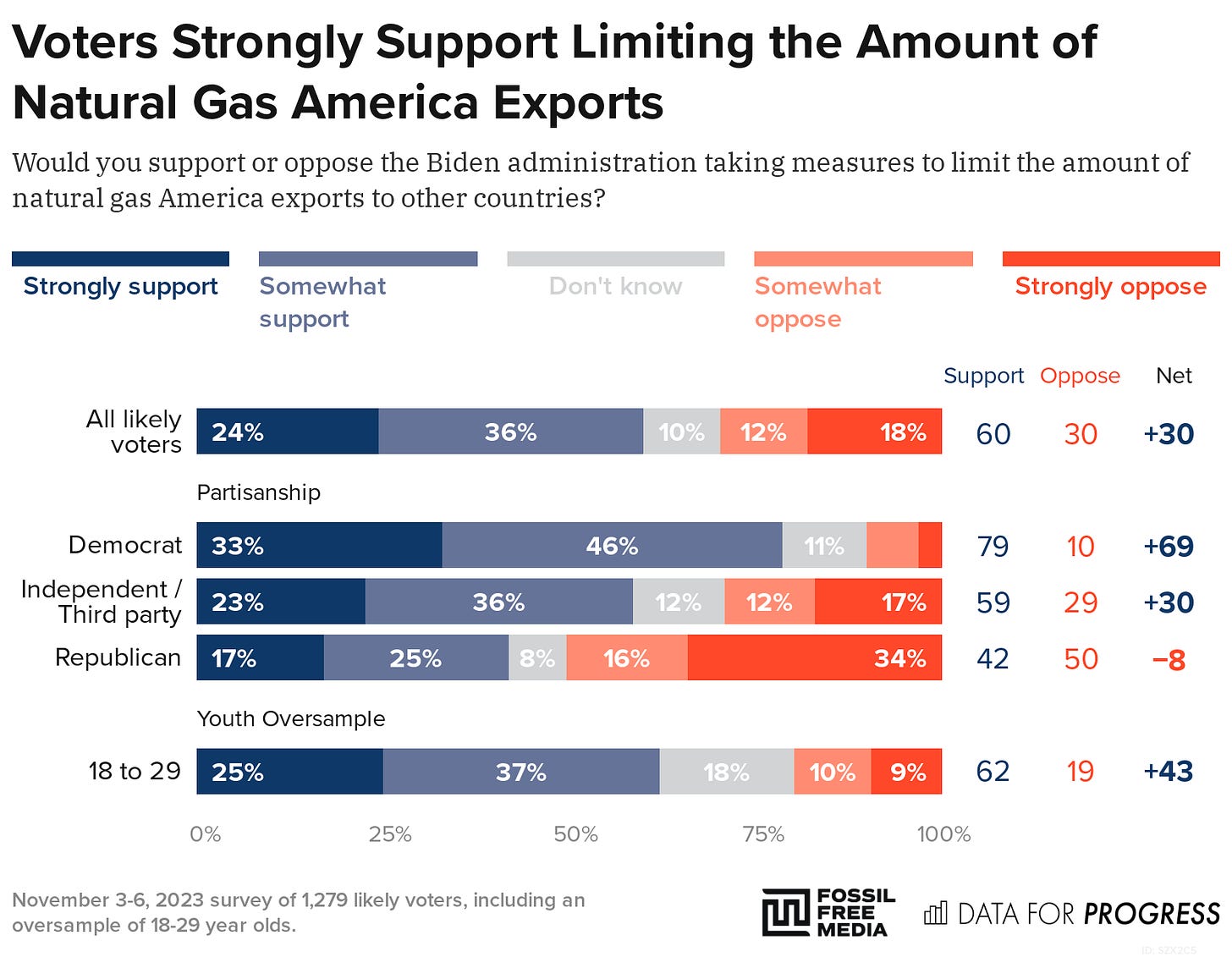Yesterday, Nov. 18, 2023, the planet’s temperature went past the 2.0 degree Celsius barrier for the first time. It’s temporary—but it’s a terrible reminder that we’re now in the desperate end game for global warming. And yet no one noticed because—unavoidably—the world’s attention is riveted on the horrors in Gaza.
The best reason for a ceasefire there is that the war is a humanitarian disaster; the macabre evil of the Hamas raid on Israel has long since been repaid by the industrial terror of Israel’s response. The proverbial eyes and teeth are attached to altogether too many literal and bloodied bodies. But if you need another reason: on a rapidly heating planet the world cannot afford to have its attention endlessly diverted. We talk about the “ancient” nature of the Mideast conflict, and indeed it’s been contested for several thousand years. But this year saw the hottest temperatures in 125,000 years—which is to say, we’re now experiencing in real time heating that outpaces anything from a very long ways before human history. We have almost no time to slow that heating—the Intergovernmental Panel on Climate Change says we need to cut emissions in half in the next six years to have an outside shot at holding temperatures to anything like a livable level. And that means that we’ve got a duty to move on the things that are preventing action. One, clearly, is the fight over Palestine; it’s never been clearer that these two sides are here to stay, and that some kind of working territorial compromise must be brokered. The Netanyahu government, with its endless indulgence of settler extremists and its endless efforts to put off the legitimate demands of Palestinians, has failed its people and failed the world.
Even if all you cared about was this one region in the world, you’d want and need to do something about climate change. Because the land here, theoretically so sacred to all sides, is in danger of turning into an uninhabitable desert. At the moment, the region is warming twice as fast as the world as a whole. Here’s some data (very little of which comes from Israel’s government, because as a detailed report in Haaretz found, the Netanyahu government has ignored the issue as profoundly as it has ignored so much else).
#Since 1980 the average number of high fire-risk days per year in Israel increased by a factor of 2.5 and very high fire-risk days saw a three-fold increase
#In the last three decades, Israel saw a 3.4 percent decline in precipitation; in the coming decades, this is expected to increase to 24 percent less rainfall than the current annual average.
#“Large parts of the coast are expected to disappear due to the rising sea level.” The news from the Antarctic and Greenland has been unremittingly grim this year; “even if sea levels were to rise just half a meter, entire coastal strips would disappear.”
(Haaretz reports that one of the few government ministries that’s begun to take climate change seriously is…the military. “There is a fear that military aircraft “will have difficulty taking off in conditions of extreme heat, and operational activity will be affected by extreme weather more than anything else.”)
Not surprisingly, the outlook is even grimmer for Gaza. The Turkish news agency AA reported last month that an MIT study, found that the average annual precipitation in the region will fall 10% to 30% by 2100, temperatures will increase by 3 to 5 degrees Celsius, and it will affect the region's agricultural productivity and food supply, causing price instability and food shortages.
Of course, Gaza’s environmental woes are deeply tied to the political conflict; Israel has used its control of water sources to help dominate the region. Even before the current siege began, the report said, the average water use per person per day in Gaza was 45 liters, less than half of what the UN sets as a livable lower limit. While the World Health Organization (WHO) noted the acceptable lower limit of water per person per day is 100 liters (26 gallons), the figure drops to 45 liters in Gaza, 50 in Jerusalem and the West Bank and 20 in some areas under Israeli control. “Water scarcity in Gaza pushed residents to buy more water from private companies, and 97% of the population tried to meet their water needs from unregulated private water tankers and small-scale, unofficial treatment plants. It said households spend one-third, and in some periods, half of their income on water, and noted that 64% of the population is in poverty and drinking water has become expensive.”
As the Times reported last autumn, “the flow in the Jordan River is less than 10 percent of its historical average, and the Yarmouk River, a major tributary, is greatly diminished. The Jordan’s once-rushing waters feed into the Dead Sea, a saltwater lake that is disappearing.”
And that’s now. Which is to say, Palestine can be free from the river to the sea, but if the river has dried up the chant means a good deal less. (Meanwhile the sea in question is warming much faster than the rest of the world). Israel has wealth and technology enough to keep agriculture up and running for a while, but as Haaretz reported the country must urgently “examine ways of maintaining food security as the supply of many crops is likely to suffer” because “climate change will also cause changes in the development of pests and diseases – they will spread to areas where they didn’t previously exist.” The land of milk and honey is trending in the direction of sand and flies.
It is, of course, too much to demand that Israelis and Palestinians figure out how to put the long-term ahead of the short-term. At the moment they prioritize security and justice; if your cities are being bombed or your citizens held hostage, that life-and-death drama is going to produce too much adrenaline to allow clear thinking. it’s up to other powers, above all the U.S., to shoulder them in the right direction; if superpower is to mean anything non-contemptible, that would be it.
The world is supposed to gather in Dubai in a few days to try and take the next halting steps towards dealing with this crisis. That conference was already damaged by deep conflicts of interest; it’s chair heads a big oil company that has announced its intention to expand production. But now the conference’s attention will be—again, unavoidably—diverted by the crisis in Palestine. Each day on this earth climate change is the most important thing that happens. But each day these fights stretch on is another day we don’t remember that; another day when, mesmerized by the blood and injustice, we focus instead on the deep, sick attraction of war. It’s impossible to look away; our humanness is defined in part by the short-term fascination with the violent and sad. Human nature has been conditioned by long experience to see the real fights as the ones between humans—that’s what Scripture is about, and history, and drama, with the natural world forming a backdrop. But quite suddenly that backdrop needs to be the foreground; the most essential fight on earth right now is between people and physics.
A longstanding conceit of science fiction is that something from outside—an alien invasion, say—would cause us to come together as a species, figuring out how to muffle our other differences so we could deal with that emergency. In this case the alien force is heat, pushing the temperature past the boundaries of human survival in ever more places. And so that script would require the world’s powers to leverage some kind of settlement—to do what they can to see the failed Netanyahu government off and actually insist on some kind of solution that respected the legitimate yearnings of everyone in the region.
In the most sanguine possible take, the work—necessarily global—to pause this fight and reach some kind of modus vivendi just might be practice for tackling the larger question that hangs before us. Which is whether we can still preserve a working planet. Justice for eight billion demands we give it a try.
In other energy and climate news:
+Fewer parking spaces could help the planet in all kinds of ways, as Grist’s Siri Chilikuri reports, describing efforts in Austin Texas to change laws that requrie a minimum number of parking spots before you can build anything else
The elimination of this seemingly innocuous law could pave the way for cities to build denser housing, increase public transit options, and reduce their carbon emissions, according to Donald Shoup, an engineer and professor of urban planning at UCLA.
“It isn’t just the housing crisis and climate change, it’s traffic congestion, it’s local air pollution, it’s the high price of everything — except parking,” said Shoup.
Climate change and air pollution are particularly costly outcomes, with both estimated to cost the U.S. billions of dollars every year. Parking spots, meanwhile, can run in the tens of thousands of dollars to construct, with one estimate putting that figure at almost $30,000 per spot.
“Even if climate change were not an issue, removing parking requirements is a good idea. But in addition to being a good idea locally, it will help the entire planet,” he said.
+Following up on yesterday’s newsletter on LNG, new data from the polling group Data For Progress makes it clear that voters, by a very wide margin, hate LNG exports. And for young voters the margin is far wider still:






"The macabre evil of the Hamas raid on Israel has long since been repaid by the industrial terror of Israel’s response."
Because I'm such a big fan of your work on climate change, I'm especially taken aback by this statement. The point of Israel's actions in Gaza, at least as I understand it, is not to "repay" the evil of October 7. While there are no doubt many who wish for retribution and revenge, Israel's actions are meant to destroy Hamas so that its citizens will never again face similar attacks (which Hamas is promising to launch repeatedly). It's fair to argue, with evidence, that the magnitude of destruction caused by Israel's response is more than necessary to achieve this objective. You might even argue that Israel has no right to defend itself if such defense necessitates killing innocent civilians. But to argue as if this was only about revenge is missing the point. Thanks!
One of Israel's claims to fame is that they turned a desert green.
So much for that.